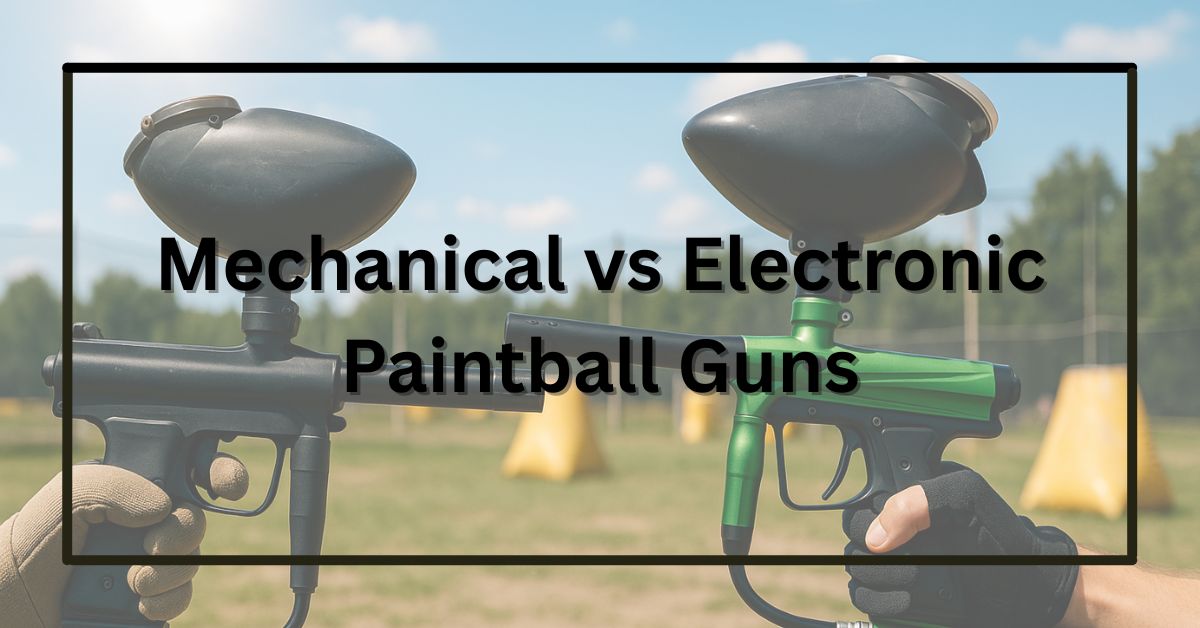Choosing the appropriate paintball gun may make or break your field experience. Whether you’re a casual weekend warrior or a serious contender, knowing the distinction between mechanical and electronic paintball guns is critical.
Both types have their own strengths, weaknesses, and ideal uses—and knowing which fits your playstyle can help you shoot faster, play smarter, and enjoy every game to the fullest.
What’s the Difference Between Mechanical and Electronic Paintball Guns?
At first glance, most paintball markers look similar. But what’s happening inside is completely different.
- Mechanical paintball guns operate using a spring, valve, and air pressure system. Each trigger pull fires one shot that is simple, reliable, and battery-free.
- Electronic paintball guns, on the other hand, use a battery-powered circuit board and solenoid to fire paintballs electronically. They allow advanced firing modes like ramping, burst, or full-auto.
Both serve the same purpose of shooting paintballs, but they do it in very different ways.
Mechanical Paintball Guns: The Classic Choice
How They Work:
Mechanical markers employ pressurized air or CO₂ to propel paintballs. When you pull the trigger, a valve opens and air is released, allowing the ball to be fired.
Key Features:
- Usually semi-automatic or pump-action
- Built for durability and simplicity
- Minimal maintenance required
- Perfect for woodsball and recreational play
Popular Models:
- Tippmann 98 Custom
- Planet Eclipse Emek 100
- Spyder Victor
Why Players Love Them:
Mechanical guns are dependable. They are also simple to maintain and effective in all weather conditions, including dirt, rain, and dust.
Electronic Paintball Guns: The High-Tech Option
How They Work:
Electronic markers use a circuit board and a solenoid valve controlled by a microprocessor. Instead of relying on pure mechanical action, your trigger activates an electronic switch that fires the marker.
Key Features:
- Multiple firing modes (semi-auto, burst, ramping, full-auto)
- Extremely light and fast trigger pull
- Higher firing rates—up to 15+ balls per second
- Powered by a 9V or rechargeable battery
Popular Models:
- Planet Eclipse Etha 3
- Empire Axe 2.0
- Dye M3+
Why Players Love Them:
Electronic paintball guns are all about speed, precision, and control, making them the top choice for speedball and competitive play.
Mechanical vs Electronic Paintball Guns: Key Differences
Feature | Mechanical Guns | Electronic Guns |
|---|---|---|
Firing System | Air-powered valve | Electronic solenoid |
Rate of Fire | Slower (semi-auto only) | Faster (multi-mode) |
Maintenance | Simple | Requires more care |
Durability | Excellent in all conditions | Sensitive to moisture |
Price Range | $100–$250 | $300–$1,000+ |
Ideal For | Beginners, Woodsball | Speedball, Tournament Play |
Pros and Cons of Mechanical Paintball Guns
Pros:
- Super reliable and weather-resistant
- Low maintenance and repair costs
- No need for batteries or electronics
- Great for outdoor and scenario games
Cons:
- Slower firing rate
- Heavier trigger pull
- Less consistent accuracy
If you are new to paintball or prefer tough, outdoor action, a mechanical marker is an excellent place to start.
Pros and Cons of Electronic Paintball Guns
Pros:
- High rate of fire and responsive trigger
- Multiple firing modes for flexibility
- More efficient air use
- Smooth, consistent shooting
Cons:
- Requires batteries and electronic upkeep
- More expensive to buy and maintain
- Sensitive to dirt, water, and debris
Electronic guns provide unsurpassed speed and precision to competitive or speedball players.
Which Paintball Gun Is Right for You?
Your ideal paintball marker depends on your experience level, environment, and playstyle.
For Beginners:
Go with a mechanical marker. It’s simple, budget-friendly, and forgiving for new players.
For Woodsball or Scenario Games:
Mechanical markers shine; they’re reliable and durable in outdoor settings.
For Competitive or Speedball Players:
Electronic markers are the best, fast, accurate, and customizable for advanced gameplay.
For Casual or Weekend Players:
A basic mechanical model will serve you well without breaking the bank.
Tips for Choosing the Right Marker
- Set a budget—mechanicals are cheaper, but electronics have more features.
- Try both types before buying—many paintball fields offer rentals.
- Check maintenance needs—choose what you can comfortably maintain.
- Think about upgrades—look for models with good aftermarket support.
The right marker isn’t just about power; it’s about fit, comfort, and playstyle.
Conclusion:
There is no clear winner in the mechanical versus electronic paintball gun argument; do what is best for you. If you love simplicity, reliability, and low maintenance, a mechanical marker is the perfect companion.
If you crave speed, customization, and tournament performance, go electronic and never look back.
No matter which you choose, remember: the best paintball gun is the one that helps you play your best and enjoy the game every time you hit the field.

